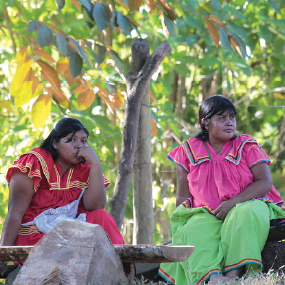Abstract
This article explores the life experiences of indigenous women in a Ngöbe context in southern Costa Rica in relation to their community participation. The analyzed data was obtained through ethnographic fieldwork carried out in this community between 2015 and 2016. Data was gathered through participant observation and interviews with 16 indigenous women and nine other people from the community. This article also benefits from the constant interaction with these women since then. Experiences such as the end of a relationship, access to income, a partner’s illness, and access to education, among others, impact their involvement in community activities. Although paid work and domestic responsibilities often limit women’s participation in community organizations, women also transform the micropolitics of their community by advancing practices and discourses highlighting the importance and impact of women’s actions. Furthermore, women’s sense of belonging and connection to their Ngöbe identity and territory, despite placing them in a position of oppression and inequality, become drivers of agency in the domestic sphere, the community and local context.
References
Cabnal, L. (2017). Tzk´at. Red de sanadoras ancestrales del feminismo comunitario desde Iximulew-Guatemala. Ecología política, 54, 98-102. https://www.jstor.org/stable/44645644
Chindoy Jansasoy, Y., y Ulloa, A. (2023). Defensas cuerpo-territorio de las mujeres camëntšá, Colombia: acciones estético-políticas y propuestas conviviales. IBEROAMERICANA, 23(84), 31–56. https://doi.org/https://doi.org/10.18441/ibam.23.2023.84.31-56
Cortés Campos, A. (2001). El sincretismo de la religión de Mama Chi entre los Ngöbes del sur de Costa Rica. [Tesis de Maestría]. Universidad de Costa Rica.
Espinosa Damián, G. (2009). Movimientos de mujeres indígenas y populares en México: encuentros y desencuentros con la izquierda y el feminismo. Laberinto, 29, 9-28.
Franco, T., y Merhy, E. (2009). Mapas analíticos: una mirada sobre la organización y sus procesos de trabajo. Salud colectiva, 5(2), 181–94.
Gargallo, F. (2012). Feminismos desde Abya Yala: ideas y proposiciones de las mujeres de 607 pueblos en nuestra América. Editorial Corte y Confección.
Gouthro, P. A. (2009). Neoliberalism, lifelong learning, and the homeplace: problematizing the boundaries of ‘public’ and ‘private’ to explore women’s learning experiences. Studies in Continuing Education, 31(2), 157-172. https://doi.org/10.1080/01580370902927733
Guattari, F., y Rolnik, S. (2006). Micropolítica: Cartografías del deseo. Traficantes de Sueños.
Gutiérrez Slon, J., y Moya Aburto, C. (2018). Pueblos indígenas y Estado costarricense: disputa de derechos y control territorial. Revista Rupturas, 8(2), 169–192. http://dx.doi.org/10.22458/rr.v8i2.2209
Hernández Castillo, R. A. (2010). The emergence of indigenous feminism in Latin America. Signs: Journal of Women in Culture and Society, 35(3), 539-545.
Idárraga, M. (2020). Íntimo y público: mujeres indígenas como sujetos y como asuntos políticos, Vaupés, Colombia”. En A. Ulloa (ed.), Mujeres indígenas haciendo, investigando y reescribiendo lo político en América Latina (pp. 63–103). Universidad Nacional de Colombia.
Janning, M. (2008). Public spectacles of private spheres: an introduction to the Special Issue. Journal of Family Issues, 29(4), 427-436. https://doi.org/10.1177/0192513X07310303
Mackay, F., y Morales-Garro, A. (2014). Violaciones de los derechos territoriales de los pueblos indígenas: el ejemplo de Costa Rica. Forest Peoples Programme (FPP) http://www.forestpeoples.org/sites/fpp/files/publication/2014/02/violationsterritorialrightscostaricaspanishfeb2014.pdf
Mahmood, S. (2011). Politics of piety: The Islamic revival and the feminist subject. Princeton University Press.
Maldonado, C., y Artía Rodríguez, P. (2004). “Now we are awake”: Women’s political participation in the Oaxacan Indigenous Binational Front. En J. Fox y G. Salgado Rivera (eds), Indigenous Mexican migrants in the United States (pp. 495-511). Center for U.S.- Mexican Studies and Center for Comparative Immigration Studies at the University of California.
Marcos, S. (2014). Feminismos ayer y hoy. Poiésis-Revista do Programa de Pós-Graduação em Educação, 8(13), 8-29.
Massey, D. (1994). Space, place, and gender. University of Minnesota Press.
Mora, M. (2014). Repensando la política y la descolonización en minúscula: Reflexiones sobre la praxis feminista desde el zapatismo. En M. Millán (coord.), Más allá del feminismo: caminos para andar (pp. 155-182). Red de Feminismos Descoloniales.
Okin, S. M. (1998). Feminism, women’s human rights, and cultural differences. Hypatia, Special Issue: Border Crossings: Multiculturalism and Postcolonial Challenges, Part 1, 13(2), 32-52.
Paredes, J. (2017). El feminismocomunitario: la creación de un pensamiento propio. CORPUS, 7(1), 1-9. https://doi.org/10.4000/corpusarchivos.1835
Quesada Cordero, C. (2024). Violencia de género en una comunidad indígena Ngöbe de costa rica: Reflexiones sobre las respuestas de mujeres indígenas ngöbes. AIBR, 19(1), 39-62. https://doi.org/10.11156/aibr.190103
Segato, R. (2021). La crítica de la colonialidad en ocho ensayos: y una antropología por demanda. (3a Ed. Revisada) Prometeo Libros.
Speed, S. (2006). Rights at the intersection: Gender and ethnicity in neoliberal Mexico. S. Speed, R. Castillo y L. Stephen (Eds), Dissident women: gender and cultural politics in Chiapas (pp. 203-221). University of Texas Press. https://doi.org/10.7560/714175-015
Sánchez Arias, G. A. (2018). Linguistic political ecology with the Ngäbe Indigenous people of Panama. [Tesis de doctorado]. Louisiana State University and Agricultural & Mechanical College.
Tzul Tzul, G. (2015). Mujeres indígenas: Historias de la reproducción de la vida en Guatemala. Una reflexión a partir de la visita de Silvia Federici. Bajo el Volcán, 15(22), 91-99. https://www.redalyc.org/pdf/286/28642148007.pdf
Ulloa, A. (2020). Mujeres indígenas haciendo, investigando y reescribiendo lo político en América Latina. Biblioteca Abierta Colección General, Serie Estudios de Género. Universidad Nacional de Colombia
Velásquez Cepeda, M. C. (2004). Migrant communities, gender, and political power in Oaxaca. En J. Fox y G. River-Salgado (eds), Indigenous Mexican migrants in the United States (pp. 483-494). Center for U.S-Mexican Studies.
Vázquez-García, V., y Chávez-Arellano, M. E. (2012). Entre lo público y lo privado. Mujeres gobernando municipios de Tlaxcala, México. Ra Ximhai, 8(1), 83-99.
Weir, A. (2013). Identities and freedom: feminist theory between power and connection. Oxford University Press.
Worthen, H. (2015). Indigenous women’s political participation: Gendered labor and collective rights paradigms in Mexico. Gender & Society, 29(6), 914-936. https://doi.org/10.1177/0891243215602103







